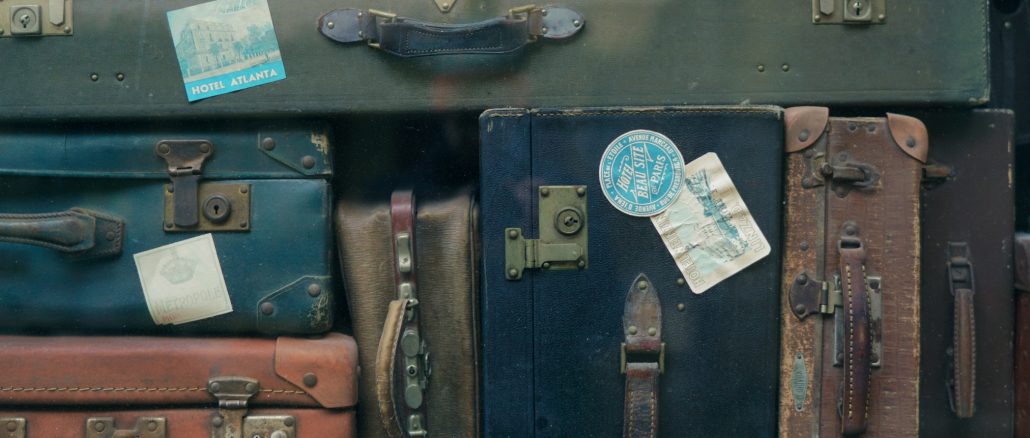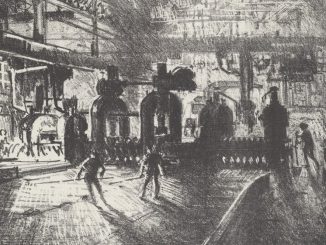
“I feel that the suitcases and their contents speak more about these people than their medical histories ever could.” Jon Crispin, “The Willard Suitcases”
“You stole my suitcases. That’s not right.” After my 85-year-old mother was moved into assisted living, she worked herself into a crescendo of anger every time we talked on the phone. For weeks she’d blamed me for every item that disappeared from her large independent living apartment after the chaotic move, when my brother and I had tossed an avalanche of possessions. There was nothing I could say, it seemed, as she detailed each missing item.
“Ask Sherry Lee,” I told her when she started on the picture frames and dishes and paintings, but she wouldn’t hear that. Her caregiver Sherry Lee was her favorite and could do no wrong.
I could visualize my mother, her silver hair newly permed, her face reddened and quivering with indignation. The small room in assisted living always smelled faintly of urine, perhaps from her diaper, or from the portable commode she used at night. There was a hum in the halls, the clatter of nurse’s aides pushing carts and making the rounds, the odor of disinfectant mingled with the smell of cooked meat loaf.
I sat at my kitchen table doodling on a yellow pad during our phone call, my chest constricting, shoulders tense. “You knew I took the suitcases, Mom. I needed something for all of the photographs and genealogy research Dad did.”
It was all out in our garage now, and I had no idea what I was going to do with the folders of computer printouts, shoeboxes of photographs, books about churches and small towns in Ireland. I knew I couldn’t throw away the product of so much work, but I felt burdened by it. Did I have to complete the research and write our family history? Was there anyone alive who was interested?
“You said you were borrowing them.”
“Listen, I’ll buy you some new suitcases. I’ll call the assisted living office and get someone to buy some. I’ll send my own money.”
In fact I’d bought her the suitcases she was so incensed about, when she refused to replace their old brown tweed suitcases (“They’re a set! They were expensive!”). She didn’t seem to remember that. I’d taken her to TJ Maxx during one of my visits to North Carolina and had her test out the wheeled suitcases, looking for the lightest and easiest to handle. They were ordinary, black, easily replaceable.
Her voice rose. “I don’t want new suitcases. I want my suitcases, and I don’t want those people involved in my business.”
Before I’d called her, I’d been enjoying the morning. The smell of coffee in the cup cradled in my hands. The sun that streamed in the kitchen windows, warming my shoulders and reflecting off the wooden table.
“Okay, I’ll send them back to you.”
“Sherry Lee wouldn’t do this. She asks before she does things. Do you know how much she and her family has done for free? All that moving.”
Sherry Lee had been systematically robbing her—of her car, of $7000 worth of kited checks in the six weeks since the move to assisted living. Sherry Lee’s relatives had hauled away furniture and housewares and knickknacks they’d helped themselves to for free. I knew I wasn’t going to be able to contain myself and I didn’t. “You’ve got to be kidding.”
By the time we got off the phone we were both incoherent with rage. Not our first fight. Not our last either.
I should have been more understanding, but in the face of her bile and accusations it was so difficult. Five years after her death, it’s still difficult.
I’ve come to realize that the suitcases symbolized something much bigger to her. Something that in fact had been stolen from her, but not by me. Youth, health, mobility, freedom, self-determination. She raged against all the rules and oversight in assisted living. Her Lewy body dementia was advancing and she was often confused, angry, and frightened by the disparity between what she believed to be real and what others claimed. Frequently she insisted that she was one of the nurses, not a patient. She could hardly manage the short distance from her bedroom to the dining room using her walker. But she wanted to believe that she could pick up and travel.
Among the deceased patients’ belongings that were discovered in the attic at Willard State Mental Hospital when the facility closed down in 1995 was a set of eighteen trunks and suitcases from a patient who’d arrived in 1941 with an entire household of possessions—dishes, cutlery, pots and pans, teapots, bowls, vases, nurse’s uniforms, clothing, lamps, board games, unfinished needlework, skeins of yarn, spools of thread, buttons, bills, receipts, a picnic basket, maps, hundreds of photographs and postcards and souvenirs from trips—all of the unsorted detritus my mother wanted to keep as well. The patient brought her car, which was soon repossessed. Doctors’ reports in her file in the forties, fifties, and sixties described her as suffering from “elaborate delusions” and “markedly hallucinated.” I imagine the doctors’ reports about my mother, whose dementia progressed rapidly, might say the same. “She lacks insight, judgment is poor, and she feels she should be released from the hospital,” the Willard doctors wrote. The inmate must have thought that Willard, a facility for mentally ill “incurables,” was just a way station on her way to somewhere else. A new home where she could live on her own premises.
I sent my mother’s three suitcases back to her, packed inside of each other like Russian dolls. She kept them in her small room, propped against the wall in the narrow space between her bed and the window, making it difficult to open the closet door. She continued to rage against me and the assisted living staff. She continued to complain that she’d been robbed. She never took another trip. Like the patient at Willard, she died in the institution she wanted to escape, hoarding her empty suitcases.
 JACQUELINE DOYLE lives in the San Francisco Bay Area. Her flash chapbook The Missing Girl was published by Black Lawrence Press in 2018. She has recent creative nonfiction in The Gettysburg Review and New Ohio Review, and recent flash in Wigleaf, New Flash Fiction Review, Sweet, and Post Road. Her work has earned four Notable Essay citations in Best American Essays.
JACQUELINE DOYLE lives in the San Francisco Bay Area. Her flash chapbook The Missing Girl was published by Black Lawrence Press in 2018. She has recent creative nonfiction in The Gettysburg Review and New Ohio Review, and recent flash in Wigleaf, New Flash Fiction Review, Sweet, and Post Road. Her work has earned four Notable Essay citations in Best American Essays.
Twitter: @doylejacq
Featured image: Photograph by Erwan Hesry on Unsplash.
Essay sources: See Jon Crispin’s “Willard Suitcases” project (https://www.willardsuitcases.com) and chapter 6 of Darby Penney and Peter Stastny, The Lives They Left Behind: Suitcases from a State Hospital Attic (New York: Bellevue Literary Press, 2008).


